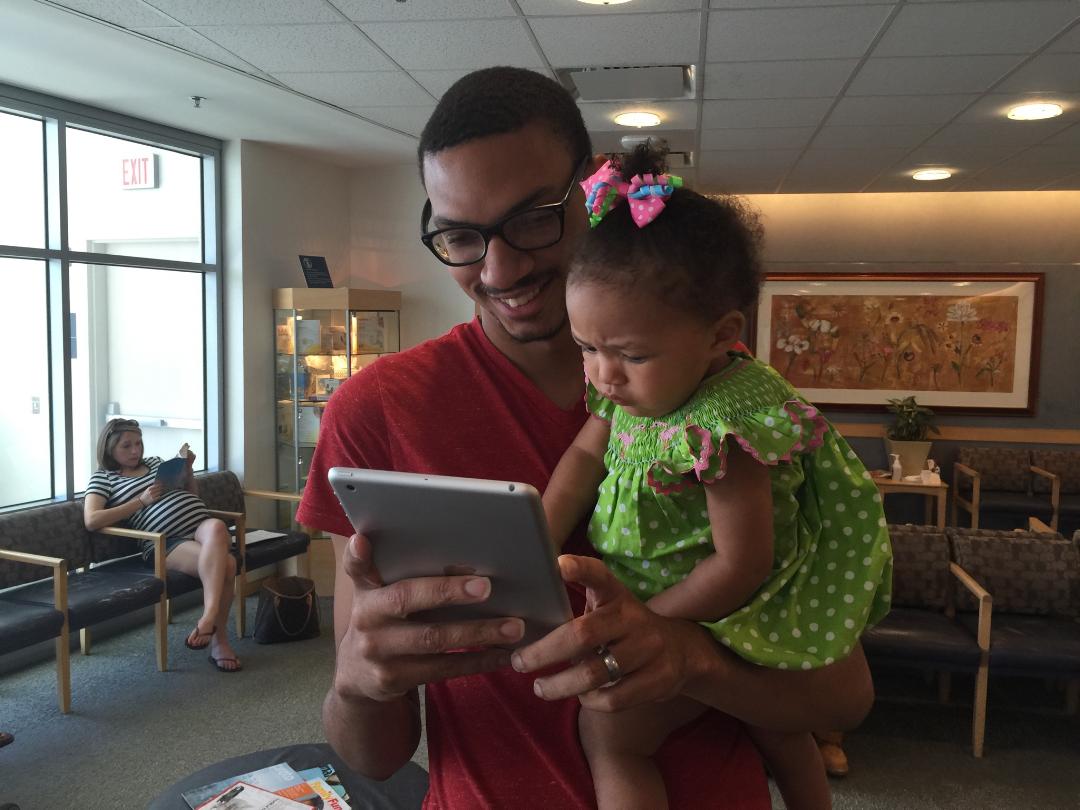
A father completes TFP’s father engagement survey while holding his young daughter at
MGH’s Vincent Obstetrics.
“Expectant fathers contributions have been understudied, and efforts to capitalize on their motivations have been minimal.”[i]
Last week, The Fatherhood Project’s Director Ray Levy and Director of Programs John Badalament attended the National Institute of Child Health and Human Development’s conference, Fatherhood Outreach: Implications of Men’s Health and Community Engagement in Pregnancy Outcomes. They connected with and learned from senior researchers, including Craig Garfield, a pediatrician and leading researcher on father involvement in prenatal care. The presentations and discussion were at a uniformly high level, and directly related to the work TFP is doing to increase father engagement during the prenatal period. The research presented by Garfield and others reinforced the importance of our work, and our team returned even more motivated to develop TFP research, staff training, and direct services to fathers.
On July 31st, TFP launched our Father Engagement Initiative at Massachusetts General Hospital’s Vincent Obstetrics, and began administering a survey to fathers visiting the OB Service. In the first five days of the study, we have received data from over 200 men. This strong interest and willingness to participate on the part of a diverse population of men suggests that the secret to increasing research on men is TO ASK THEM! We are on track to collect a large number of responses from fathers during the two-week study period. The data from the survey will be used to increase the fund of knowledge about fathers at the time of pregnancy, suggest staff training initiatives, form evidence-based interventions, inform curriculum, and develop materials for new and expectant fathers.
“Fathers presence at birth was predictive of several indicators of involvement at 24 months, including direct caregiving activities, financial contribution, involvement in decision making, and linkages to extended family.”[ii]
We know that positive father involvement has multiple positive outcomes for children throughout the life course. Research also shows that by “bringing dads in” early, and engaging them during the prenatal period, we can help to increase the likelihood of long-term involvement with their children and families. We are enthusiastic about adding to the limited available data supporting the willingness of men to respond to research initiatives. Other conclusions about men at an out-patient obstetric service accompanying their partners and wives at the time of pregnancy await the results of our Father Engagement Initiative. Our first finding is clear: If you want to know what fathers are thinking, just ask them.
TFP looks forward to sharing our results and next steps once the initial phase of our Father Engagement Project is complete.
“The pregnancy period is likely an excellent time to prime the pump and educate fathers on their important contributions.” – Craig Garfield
[i] Garfield, Craig (2015) “Fathers, Pregnancy and the Prenatal Period” sponsored by National Institute of Child Health and Development (NICHD), Washington DC
[ii] Bellamy, J. L., Thullen, M. and Hans, S. (2015), Effect of Low-Income Unmarried Fathers’ Presence at Birth on Involvement. Journal of Marriage and Family, 77: 647–661.


